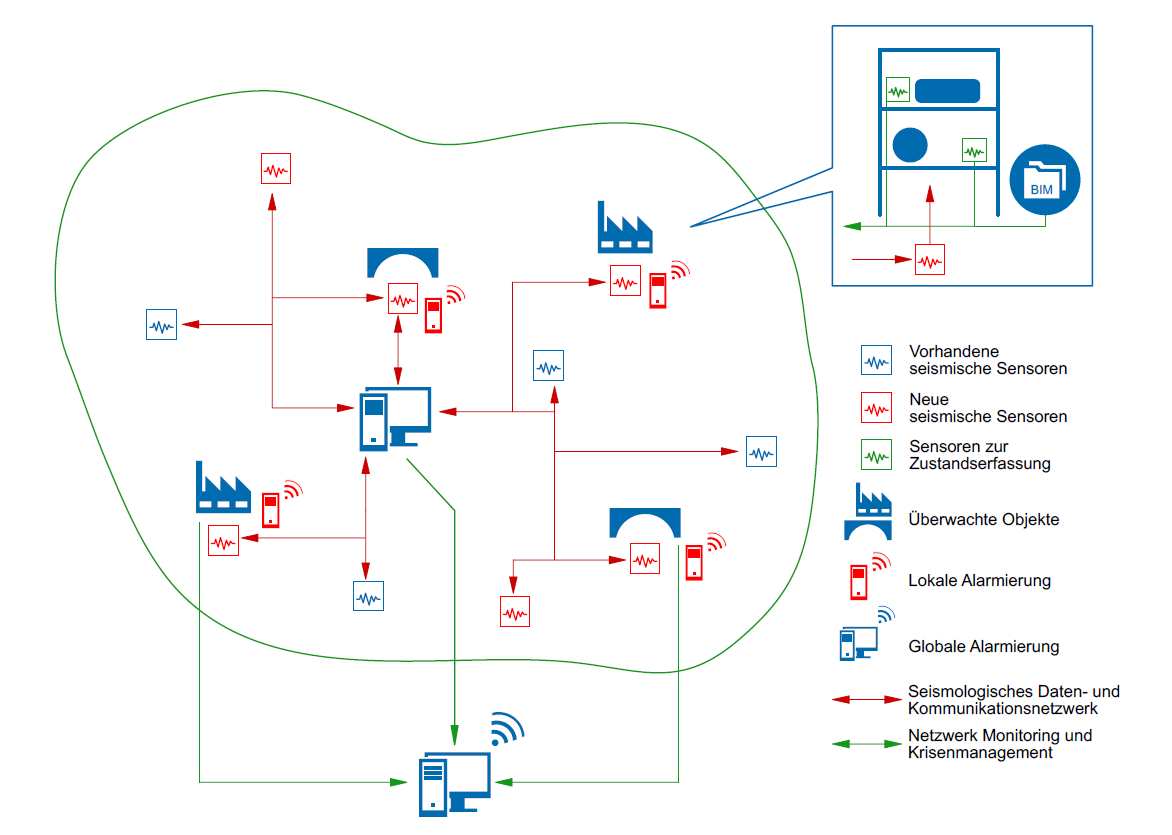| Project title: | User-oriented earthquake early warning system with intelligent sensor systems and digital building models |
| Funding authorities: | PTJ – Projektträger Jülich |
| Funding code: | 03G0892A |
| Alliance partners: | Fraunhofer-Gesellschaft zur Förderung der angewandten Forschung (FOKUS)Helmholtz-Zentrum Potsdam – Deutsches GeoForschungsZentrum (GFZ) Wölfel Engineering GmbH + Co. KG (WÖLFEL) |
| Alliance coordinator: | Center for Wind and Earthquake Engineering (CWE) Rheinisch-Westfälische Technische Hochschule Aachen Templergraben 55, 52062 Aachen |
| Project coordinator: | Prof. Dr.-Ing. Benno Hoffmeister Tel: +49(0) 241 – 80 22 14 0 hoff@stb.rwth-aachen.deProf. Dr.-Ing. Christoph Butenweg Tel: +49 (0) 241 – 60 09 53 16 0 butenweg@lbb.rwth-aachen.de |
| Project duration: | 01.01.2020 – 31.12.2022 |
Summary
Germany’s seismicity is mainly characterised by weak and often imperceptible seismic events. However, there are also regions whose recent and historical seismicity leads to moderate (M ≥ 5) to strong (M ≥ 6) earthquakes. The consequences are particularly significant for Germany as an industrialised country with a high degree of urbanisation, a dense network of infrastructures and highly industrialised exposed regions with capital-intensive and sensitive advanced technologies. In addition, the increased safety awareness of the population, authorities, organizations and industry has significantly increased the need for user-specific, real-time information after an earthquake event.
In the ROBUST project, a user-oriented earthquake early warning and response system is being developed based on the combination of interconnected decentralized sensor systems for earthquake early warning and local monitoring systems of structures with connection to digital building models (BIM). The system enables earthquake detection, the triggering of fast automatic shutdown procedures and other immediate measures, rapid damage prediction and target group-specific real-time information transfer based on a KATWARN warning system extended to a distributed, decentralized architecture.
The application of the system is carried out prototypically in the Lower Rhine Bay by integrating intelligent sensors into the existing network of the Geological Service – NRW (GD-NRW). Local monitoring systems will be installed for a bridge structure and an industrial plant and coupled with their digital building models. The functionality of the overall system will be tested and validated by simulating representative earthquake scenarios for the Lower Rhine Bay. The system is developed in close cooperation with the industrial partners in order to optimally consider the specific user requirements for the system.
Thematic focus:
- Development of intelligent sensor systems for integration into existing seismic networks, which can perform decentralised user-specific data analysis and alarming in addition to real-time data acquisition.
- Coupling of intelligent seismic sensors with local sensor systems for building monitoring and their integration into digital building models (BIM).
- To develop new methods for fast and detailed damage prediction using suitable damage indicators for reliable evaluation of changes in condition after a damage event.
- To link the developments through a distributed, decentralized communication infrastructure.

